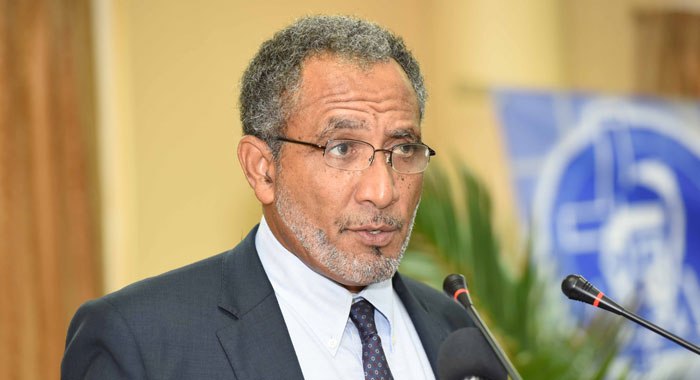(Excerpts of Dr. the Honourable Godwin Friday’s 2023 Budget Presentation Pt. 2)
The second part of the program is the Solidarity Fishing Fleet Enhancement and this program has a budget of $4.4 million and it’s mentioned in the estimated on page 494 and also in the budget. What does this mean? It is clear that the main trust of the government is developing a fishing industry which falls under the Solidarity Fishing Fleet Program because a sum of $4.4 million is allocated to this program.
The government’s plan for the development of the fishing fleet in St. Vincent and the Grenadines is to be done almost exclusively under this program, because that is where the real money is going and this is where the enthusiasm seems to be. Of a total of $4.9 million, $4.4million is going towards the Solidarity Fleet Program.
The fishermen have to go and find the rest of the money themselves to go and invest and to buy and to satisfy the criteria set by the financial institution to qualify for their loan.
And I’m told that there are other conditionalities that are just not banking; who you should sell to; who you should buy an engine from; who you should do all these things to that are creating unnecessary obstacles for many of the fisher folk and making the things seem not as attractive as it should be, but I’ll find out more. Maybe the Minister of Agriculture will explain more when he speaks.
Madam Speaker, the government said that they got a loan from the ALBA Bank and they’re using that to finance the solidarity fishing fleet. That’s where the name comes from. There was an article that was published in I Witness News about the program, and I’ll read some of it, Madam Speaker, because it gives the context as to what is the intention for the industry going forward. He said, “The $4 million,” this is quoting him in the paper, “will go to our solidarity fishing fleet expansion, which will address the challenges to supply that we will begin having because there’s so much demand from Rainforest Seafood, with the facility in Bequia and the facility in Owia, with the new hotels that are being built, and we have the demand for fish growing faster than the number of fishermen.”
And then he says, “So we have been doing a lot of consultation,” this is the Minister of Finance, “in the market, there are some industrial vessels, up to $800,000 U.S. that can harvest 120,000 pounds.” Obviously that’s not for the local fisher folk here. “And there are others that are $300,000 that can harvest up to 700,000 pounds of lobster annually and can do tuna and snapper fishing.” Then he goes on to say, “The important thing now, as fishing and the blue economy is reaching a new phase, is education and training as well as capacity.” He said that the government plans to get experienced captains to work on these vessels and then train Vincentians.
Maybe he can clarify who are these captains. Are these going to be foreign captains? Are these going to be people who will operate the boats on behalf of the government? The government is now going to own a fishing fleet. They’re going to be the most advanced part of the fishing industry and the rest of the fisher folk are going to continue to do their business in pirogues and try as best they can to make investments from loans in bigger boats if they can manage it. Then the government says, when they pay off the loans they’re going to lease them out or sell them to local fisher folk. Well, where is the capital to do that is going to come from? That has always been the bottleneck. They don’t have the means to do it.
This needs to be rethought, and the government has to start from the proposition that the industry goes forward with the fisher folk, that you have an organic development of the fisher folk in the industry, not just you have an export problem that you have created and then suddenly the local fisher folk aren’t good enough to meet it. So,we have to invent or create a new fishing industry that is owned by government with captains we don’t know where they are from and the fisher folk are then hired as deckhands and workers on the vessels. We don’t need to reinvent the wheel. As I said earlier, go to Petite Martinique and you can find out how the government is doing it. It’s from assistance that they receive and they have grown. And, now these fellas, they’re selling their boats to buy bigger boats and so forth. So many local guys in Bequia, they’re looking to see if they could buy these smaller boats from Petite Martinique.
The government’s plan for the fishing industry, Madam Speaker, seems to be wrong-headed because it sidelines the existing fisher folk and those who might follow in the usual way and fails to take into account the most important component in the development process. And that is the people who are in the industry. We must, engage the local fisher folk as the primary stakeholders in the industry and steadily develop their capacity and ultimately the capacity of the industry, not some overnight fix because you have created an overnight problem. They are tired, Madam Speaker, the fisher folk, of promises, promises, promises, and nothing is being delivered.
Another component, Madam Speaker, of the blue economy is the yachting sector. This is addressed on page 15 of the budget under tourism, but unfortunately not much is said. In the Caribbean, we are the envy of all of the Caribbean countries when it comes to yachting. Nowhere is it better, probably one of the best in the world.

